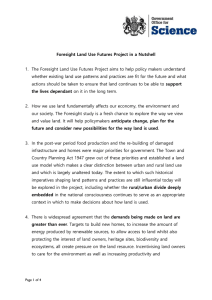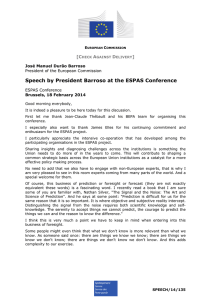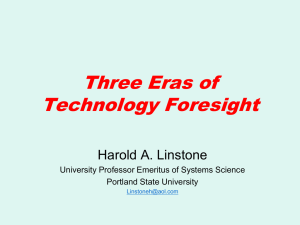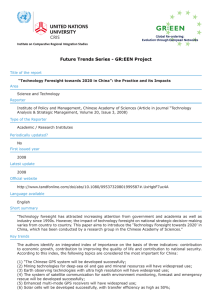Foresight in Science and Innovation
advertisement
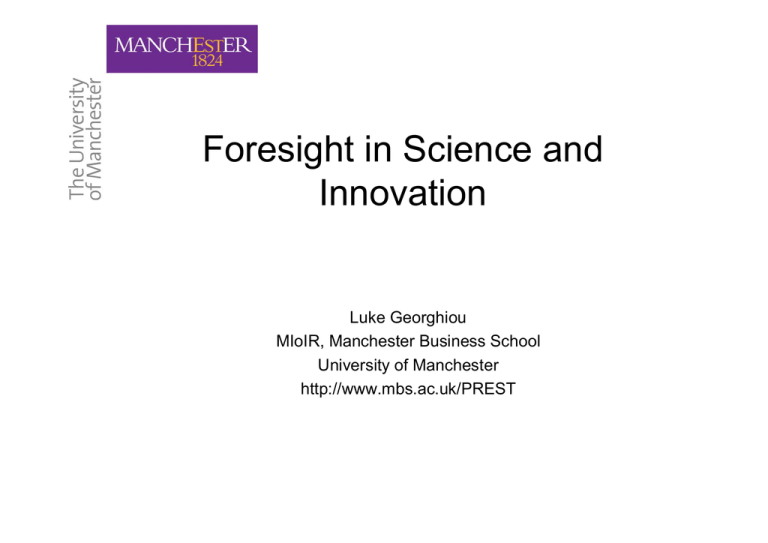
Foresight in Science and Innovation Luke Georghiou MIoIR, Manchester Business School University of Manchester http://www.mbs.ac.uk/PREST Foresight in Science and Innovation Foresight Approaches SCIENCE Policy for Science -Priorities -Network building -Field articulation Science in Policy - Informing policy for health, environment, defence, environment … INNOVATION Corporate foresight -Trends & intelligence - Developing strategy Foresight in Innovation Policy -Aggregating demand - Grand challenges Foresight for policy vs Foresight as policy • For policy – Use as a tool to inform and develop policy in any area – Also for “joining up” policy across domains – In our domain normally areas of policy with a strong science/ research input • As policy – Use as an instrument to implement budgetary, structural or cultural changes – In our domain as an instrument of research and/or innovation policy UK Foresight shift from Policy for Science to Science for Policy • First Cycle 1994-1999 – Panel based – Aim to improve connection between science base & wealth creation + quality of life – Other goals to inform priorities & promote “Foresight culture” of forward and longer term thinking “beyond the business plan” • Second Cycle 1999-2002 – Largely unsuccessful attempt to shift to thematic focus and upgrade business presence • Third Cycle 2002 – – Project based – Looks at key issues where science holds the promise of solutions; or, an area of cutting edge science where the potential applications and technologies have yet to be considered and articulated Key Image of First Cycle Priorities identified Third Cycle • • • Aim “to increase UK exploitation of science”, inform but not direct public and private research funders Replaced broad set of standing panels with fluid rolling programme of projects looking at 3-4 areas at any one time Selected by brainstorming of “visionaries” to develop shortlist of projects – key issue where science holds the promise of solutions; or – area of cutting edge science where potential applications and technologies need to be considered and articulated. • • Wide consultation with business, the science base, government departments Each project must have senior sponsor, usually Minister from relevant government department Criteria for topic selection • • • • • • Require looking ahead at least 10 years, in areas where the outcomes are uncertain. This typically occurs where the future direction of change is rapid, current trends are uncertain or different trends may converge; Have science and technology as the main drivers of change or are capable of impacting substantially on future scenarios; Have outcomes that can be influenced, to an extent that is significant for one or more of the economy, society and the environment; Are not covered by work carried on elsewhere. However, they must build from areas of active research; Require an inter-disciplinary approach to the science, and bring together groups from academia, business and government. They must not be capable of resolution by a single group; and Command the support of the groups most likely to be able to influence the future and be owned by a lead government department. Completed projects • 7 projects have launched their findings and action plans eg – – – – – – Cognitive systems (DTI/OST lead launched November 2003) Flood & coastal defence (DEFRA, April 2004) Exploiting the Electromagnetic Spectrum (DTI, April 2004) Cyber Trust & Crime Prevention (Home Office, June 2004) Brain science, addiction and drugs (Dept of Health July 2005) Intelligent Infrastructure Systems (Dept for Transport) December 2005 – Detection and Identification of Infectious Diseases (DEFRA, December 2005) Current projects • Sustainable Energy Management and the Built Environment • Mental Capital and Wellbeing • Tackling Obesity: Future Choices Method and output • Projects based on initial seminar, literature and horizon scanning, in-house and external support with use of futures techniques to avoid extrapolation • Delivery target: overview, vision of what success will look like, recommendations for action, networks keen to take recommendations forward Case study • Flood and coastal defence project – Produced a long term (2030-2100) and holistic vision for future risk of fluvial and coastal flooding taking account of climate change, land use and socio-economic change – Method was to produce range of risk-based scenarios and review possible responses to threats and implications – OST project team (4 people) + 60 experts, website consultation, workshops and commissioned work – Government Chief Scientific Adviser identified 2 key messages • continuing with existing policies not an option – in virtually every scenario considered, the risks grow to unacceptable levels. • risks need to be tackled across a broad front. Reductions in global emissions would reduce the risks substantially. However, insufficient in itself. Hard choices need to be taken – must either invest more in sustainable approaches to flood and coastal management or learn to live with increased flooding. • http://www.foresight.gov.uk/Previous_Projects/Flood_and _Coastal_Defence/index.html PREST evaluation conclusion on key impacts • • • • • • Foresight has directly informed national policies and programmes Also influenced climate of thought in relevant policy making bodies and in emergent networks General effect to bring together key players and hence to allow a more “joined-up” approach Also bringing together disciplinary combinations, which in some cases changed ways of understanding an issue or demonstrated its significance Evidence that the Programme engaged senior policymakers with science and scientists, often for the first time Little engagement with national innovation agenda Coordination across government • • • • • 2004 Government established Horizon Scanning Centre as part of 10 year investment framework for S&T Horizon scanning is defined as the systematic examination of potential threats, opportunities and likely future developments, including (but not restricted to) those at the margins of current thinking and planning. Horizon scanning may explore novel and unexpected issues as well as persistent problems or trends. To feed directly into cross-government priority setting & strategy making Delta Scan analysis of emerging trends in science and technology Sigma Scan analysis of broad set of social, economic, political, environmental & S&T Trends Some comments on Innovation Foresight Context of move to open innovation • Convergence of innovation and industrial policy in the context of knowledge economy • Concept of innovation ecosystem • Foresight role in creating shared strategic vision • Emerging reorientation of innovation policy with new emphasis upon demand-side policies – Also an industrial policy based upon fostering clusters, platforms and supply chains – Key driver of development is linkage between local capabilities and effective demand Existing experience - corporate • • • • • • Foresight in business vs Foresight for business Functions include anticipatory intelligence, direction setting, priority setting, strategy formulation and innovation catalysis Trend to “open foresight” in terms of participation, scope and delineation Close connection to proposed changes in innovation environment but also need specific actions Build corporate culture and capability to sustain foresight in enterprises that are locked into traditional thinking and markets and day-to-day survival Key lessons from major firms – Ensure engagement of principal stakeholders in company – Match open innovation with open foresight Five generations of Foresight FIRST GENERATION SECOND GENERATION Technology THIRD forecasts GENERATION Technology and Technology,FOURTH marketsmarkets GENERATION and the social FIFTH dimension Distributed GENERATION Role in Innovation System Structural & broad policy focus Extending the mandate to Innovation Foresight – structural focus • Overcoming market and system failures • Microeconomic climate for innovation • Addressing deficiencies in firms – Resources – Incentives – Capabilities – Opportunities • Also use foresight to address deficiencies in system capacity for strategic development • Foresight as balancing and linking mechanism A taxonomy of research and innovation policies Source: Edler and Georghiou Research Policy September 2007 Innovation & Industrial Policy • Emerging role for foresight in New Wave Demand-side innovation policy • Need to understand foresight in context of range of tools for innovation policy and how it can interact with, strengthen and be strengthened by combinations with other policies • Particular opportunities in demand-oriented innovation policies – Clusters and technology platforms built on base of common visions – Public procurement for innovative goods and services again driven by shared visions Potential Shift Towards Mission-Oriented Research and Innovation POlicy • • • Grand Challenge concept now being hotly debated in Europe Motivating innovation through large scale coordinated efforts involving partnership between government, business and societal groups Economic-orientation to some extent already being addressed through EU’s Joint Technology Initiatives – Public- private partnerships of up to 1 billion funding eg Innovative Medicines, Embedded Systems, Clean Skies – Also national equivalents eg UK Innovation Platforms, France Programmes Mobilisateurs • • Further potential in addressing social and sustainability challenges arising from eg climate change, migration, security Role for foresight in aggregating the key actors in the research and innovation ecosystem and building the vision Conclusions • UK and EU Foresight extending from priority setting and broad network building roles which became common in 1990s • In science domain UK has had largely successful experience of using foresight to illuminate crosscutting policy challenges for government • New challenge for foresight on the interface with innovation in a changing environment for research and innovation • Foresight will continue to adapt and reinvent itself to keep pace with the changes which it helped to induce Some links • PREST Evaluation of Current UK Foresight Programme – http://www.foresight.gov.uk/Publications/Current_round_General_Pu blications/Foresight_Evaluation_2006/Foresight_Evaluation_Final_R eport_June_2006.pdf • UK Foresight reports – http://www.foresight.gov.uk/ • Grand Challenges – http://ec.europa.eu/research/conferences/2007/fst/pdf/discussionpa per_en.pdf • Demand side innovation policy – http://ec.europa.eu/invest-inresearch/action/2006_ahogroup_en.htm – http://www.nesta.org.uk/assets/pdf/demanding_innovation_provocati on_NESTA.pdf
